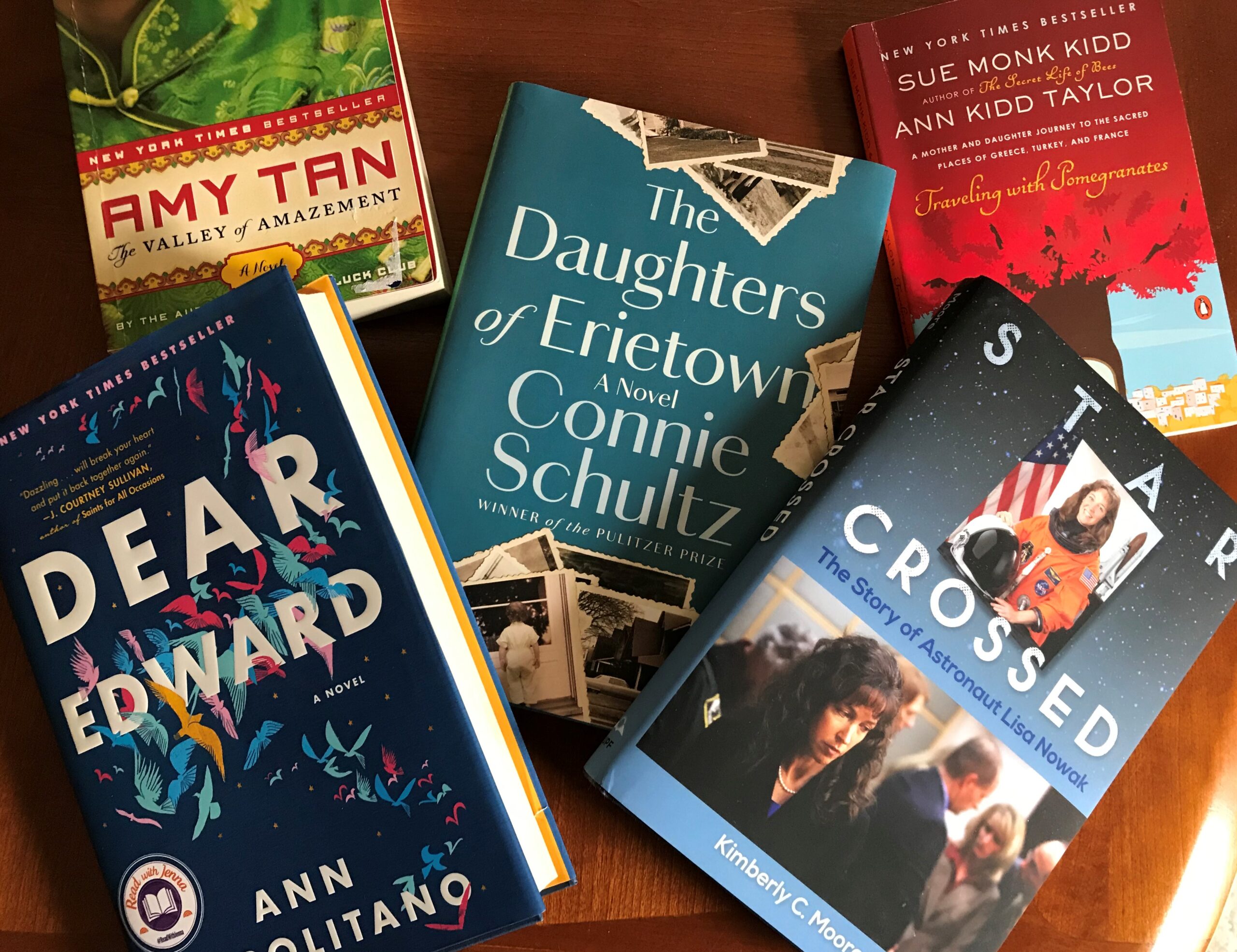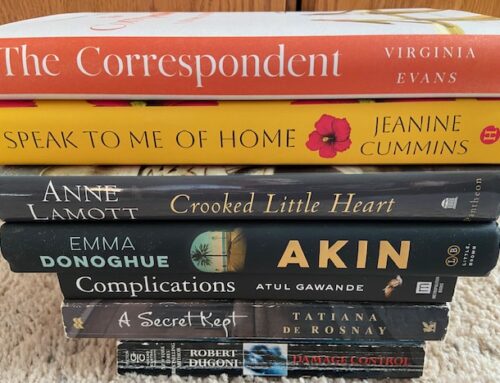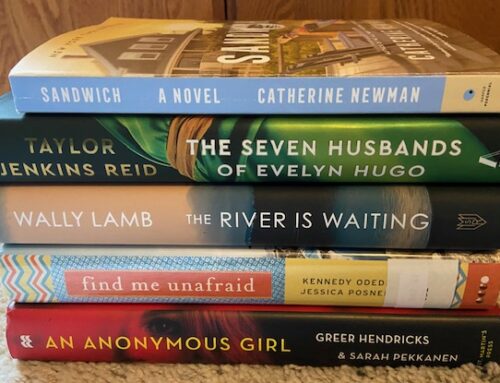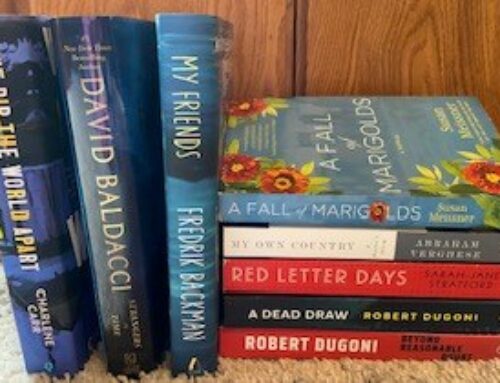We’re still living in quasi-quarantine, and my synapses don’t seem too sharp. Lesson learned: write notes about books as soon as I finish them. So what did I read?
In July, I was excited to receive newly published The Daughters of Erietown by Connie Schultz. Schultz is a Pulitzer-winning journalist and teacher at Kent State University. She’s written a couple of books, but this is her first fictional novel. Drawing from characteristics of her parents, she creates a multi-generational family who are shaped by the community and expectations of their small town. This is a beautiful, heartfelt novel of small moments, sacrifice, relationships, regrets, and a few surprises. Secret: I follow Schultz on Facebook, because her columns and life observations are wonderful, plus it makes me feel like we’re friends.
I followed that with Karolina’s Twins, a Holocaust themed novel, by Ronald Balson. It’s an older novel, weaving a mystery into the harsh portrait of a Nazi work camp.

Who, and where, are the twins? That comes later. The realistic look at the horrifying conditions and abuse the characters were forced to accept is not for the faint of heart, but we must never forget. This is what keeps drawing me back to Holocaust books.
Memoirs have become a favorite genre, so I sought out the 2009 memoir Traveling with Pomegranates by Sue Monk Kidd and Ann Kidd Taylor. I’ve long loved Sue Monk Kidd’s Secret Life of Bees, and this book is based on a spiritual mother-daughter trip through Greece/Turkey/France, during which the seeds for that novel were planted. Traveling with Pomegranates contains individual reflections on the sights and experiences, as well as bonding moments for the two women. Both had issues they were grappling with and found some clarity in the journey. Well-written and moving.
This is Where it Ends by Marieko Nijkamp is a young adult novel with an adult subject – a school shooting. It’s a gritty story told from the viewpoints of five young people, minute by minute as the incident unfolds. The teens have various connections to the shooter, and their thoughts give some insight to motive. It lacks a deeper perspective on mental health issues and the long-term impact, but it could be a good starting point for a conversation with teens in your life.
By August, my stack of books was getting short, so I re-read a novel for which my recall was sketchy except that I had liked it. Belong to Me by Marisa de los Santos is a sequel, but it easily stands alone. (I’ve read the first book, and this one was better anyway.) It’s a solid novel of women’s friendships, with an underlying tension and long-kept secrets. I liked it as a break from some heavier subjects, but it’s not totally fluffy. I don’t care for fluffy.
Dear Edward by Ann Napolitano had an interesting plot device: a young boy is the only survivor of an airplane crash in which his parents and brother perish. What happens next to Edward? The novel explores the frenzy surrounding such an incident, the ways in which good intentions sometimes have negative results, friendship and understanding, and how people heal differently. It’s a good read, with a satisfying end.
I picked up Memoirs of a Race Traitor by Mab Segrest, on a recommendation. It’s a 1994 memoir of Segrest’s activism in the 1980’s, re-released in 2019. It’s a somewhat journalistic accounting of her experiences as a lesbian civil rights advocate, sometimes jumping around the chronology. It was a timely re-release, and I really wanted to like it; while I can appreciate the role Segrest played during those years, I found the writing style a bit jarring for my tastes. I’ll admit I stopped reading halfway through.
That Kind of Mother by Rumaan Alam promised a serious look at racism from the perspective of a white mother who adopts a black child. It delivers to an extent, but I kept wanting something more. The afore-mentioned mother is naïve and entitled in an unlikable way, and the story and relationships never rang true to me. I wanted a deeper dive.
Confession: by September, my attention span was drifting, and I spent more time binge-watching tv than reading. In fairness, I had seven seasons of “Parks and Recreation” to watch before it was removed from Hulu and Netflix. Apparently, I was too busy working and mothering when the show was prime time, and I have no regrets about bingeing. Thanks Amy and Rebecca for the recommendation.
However, I did plow through the 600 pages of Amy Tan’s Valley of Amazement. Lots to like in this book. Tan creates complex characters and puts them in complex situations. Set in China’s courtesan society in the early 1900’s, the novel presents a setting unlike any we know and includes themes of empowerment, sexism, racism, identity, loss, and regret. Tan is a great storyteller, so I thoroughly enjoyed it. Trigger warning: the 1918 Spanish flu comes into play, so if you’re looking to escape the pandemic, this isn’t the book.
September brought the publication of Star Crossed: The Story of Astronaut Lisa Nowak by Kimberly Moore. As a journalist, Moore covered the criminal trial of shuttle astronaut Lisa Nowak after her bizarre journey and arrest in 2007; the book fleshes out details of the legal case, based on exhaustive interviews and research. Having grown up in the Space Coast area in the heady days of NASA, I was intrigued by the behind-the-scenes look at this weird story. The detail and insider look at astronaut life were well worth my time, even though Nowak and her ex-husband refused interviews. (Moore is a now a Lakeland-based reporter, so the local tie and Facebook friendship contributed to my interest.)
What books have you read recently – or been wanting to read? Sneak peek: Transcendent Kingdom by Yaa Gyasi is my first selection for October.





Cindy, such a fun read; started off with a bang. “We’re still living in a quasi-quarantine, and my synapses don’t seem too sharp.” Then lively and real reviews about many books I will hunt down. Thank you, enjoyed so much.
Thank you for your kind words, Beth.